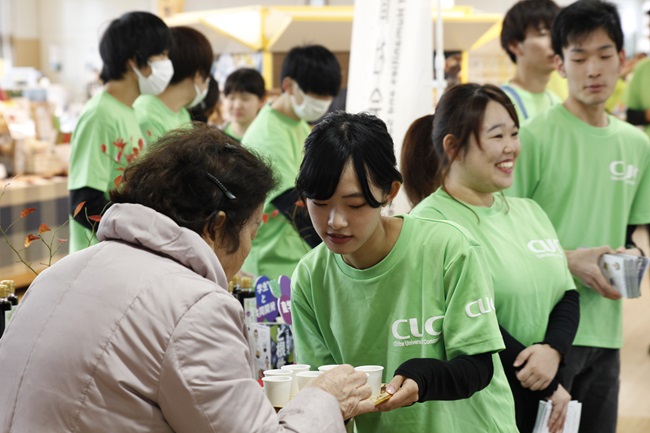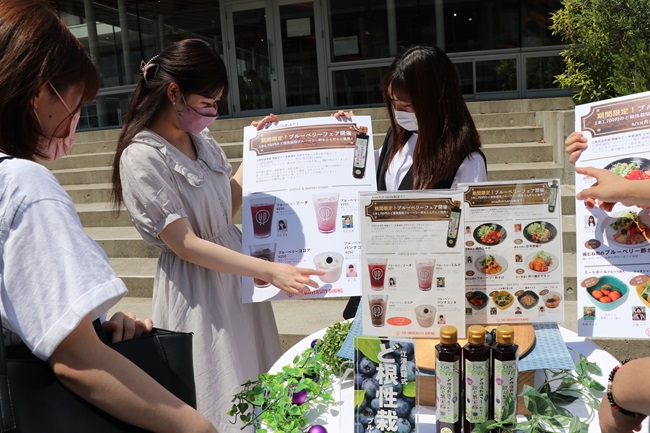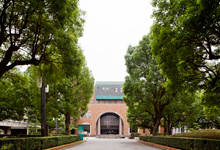At Chiba University of Commerce, all faculties will be reorganized in 2025. One of the goals is to update the practical education that the university has been working on for many years. In order to respond to increasingly complex social issues, we will provide students with future-oriented learning.
After the reorganization, the capacity of the Faculty of Human and Sociology will increase from 200 to 230 students. We will also make major changes to the curriculum. We spoke with Noriko Saito, current professor of the Faculty of Humanities and Sociology, about the aims of the new education and the characteristics of the department.

Increasing demand for “sustainability human resources”
To date, the Faculty of Humanities and Sociology has produced many ``social business professionals'' who are responsible for businesses that solve social issues. Based on the knowledge we have accumulated, we will now focus on developing "sustainability human resources."
The university's concept of sustainable human resources is someone who contributes to sustainable business with the well-being of people, society, and nature in mind. Professor Saito analyzes that demand for such human resources is increasing worldwide.
"International rules regarding sustainability are being created. For example, the EU's Corporate Sustainability Reporting Directive (CSRD) will come into effect in 2023. Companies are required to disclose their efforts on a wide range of topics, including the environment and human rights. Japanese companies doing business in the EU are also eligible, and we need people who can conduct research and disseminate information appropriately. ”
Regulations will continue to tighten around the world, and not only large companies but also small and medium-sized enterprises will be required to take sustainable initiatives. If we are unable to respond to these trends, we risk losing the market.
``We are no longer in an age where it is sufficient to simply provide high-quality products and services. All related companies must ensure that work styles that respect human rights and the selection of materials with low environmental impact are taken care of.Small and medium-sized enterprises Increasingly, companies are also being asked by their business partners to provide research reports on matters such as ESG.
Fostering collaborative skills through project training
Professor Saito believes that one of the abilities required of sustainability personnel is the ability to collaborate.
"It will be difficult to tackle all issues alone. While honing your individual expertise, you will also need to work in partnership with others to create solutions. I strongly believe that such collaborative skills are important."
In order to foster collaborative skills, a new elective course, ``Project Practical Training,'' will be established that second-year students and above can participate in. Although there have been projects carried out by faculty and students in the past, they have mainly taken up time outside of class. Making it a formal subject not only reduces the burden on teachers and students, but also makes it easier to appeal to a larger number of students.
For the project training, we have prepared 10 different themes that take advantage of each teacher's specialized field, such as the environment, regional revitalization, and product development. After students learn the basics of how to proceed with a project, they form teams with students who are interested in the same topic and work on solving problems.
``After learning theory, when students go out into the field and gain insights that were not covered in the textbooks, they begin to talk about their experiences in their own words.In project training, through these experiences, students learn I want them to develop their thinking as well.”
Professor Saito's seminar also includes the ``Blueberry Project,'' in which students voluntarily work to solve social issues.
The impetus for its launch was a survey conducted between 2014 and 2016 aimed at revitalizing the JR Kururi Line area. While walking along the railway line with the students and doing fieldwork, I met Sadao Ezawa, who runs a farm that grows ``Dokonji Cultivated Blueberries.''
Root-grown blueberries are not only safe and secure because they do not use pesticides or chemical fertilizers, but they are also low cost because they are planted directly into the ground, so no planting beds are required, and they do not require much maintenance because they do not require watering. Mr. Ezawa is working on business and regional revitalization through blueberries.
When the students saw this, they wondered if there was anything they could do to help. The project started and led to the development and sale of original products.

“As the students dug deeper, they realized that they could solve complex problems using blueberries as a starting point.Abandoned farmland can be used, and even newcomers to agriculture can easily grow them. Processed products could also become local specialties.We saw the potential for blueberries to contribute to the well-being of people, society, and nature."
The project not only aims to operate in the black as a business, but also emphasizes sustainability.
“If you make people work for free in order to cut down on expenses, or if you use materials that are not environmentally friendly, you cannot run a sustainable business. Students are naturally learning the same perspective.”

To quickly notice unseen issues
The new curriculum has also been enriched with subjects that consider the ``well-being of people, society, and nature.'' For example, we offer ``Introduction to Well-being'' as a compulsory class for first-year students. Several teachers with different specialized fields teach basic knowledge about well-being while incorporating the latest social trends.
Sociology subjects will also be expanded. In the compulsory class for first-year students, ``The World of Sociology,'' students take up familiar social phenomena and learn sociological perspectives and methods.
“There are a lot of invisible problems in the world. By studying sociology, I will be able to realize that even if I am not at a disadvantage, there are structures that impede the well-being of others.” As you think about ways to solve the problem, you will find the fields and subjects you need.”
When asked about his envisioned career path after graduation, Professor Saito responded emphatically, "Everything."
``Students who learn to take problems as their own and want to solve them are strong.That's why I hope that in the future all places will be fields of work for graduates.Some people will go on to work in jobs that don't exist yet.'' However, regardless of the industry, department, or company size, you will be able to utilize what you learn at university.”
There are many issues related to the well-being of people, society, and nature that have not yet emerged. It can be said that the reorganized Faculty of Humanities and Sociology will be the first to notice invisible issues and take proactive measures.
``We welcome not only people who are interested in sustainability, but also people who don't know what they want to do, and students who want to improve their collaborative skills.If you are attracted to learning at the Faculty of Humanities and Sociology, please come and visit us. ”
The Faculty of Humanities and Sociology is developing sustainability professionals with a new curriculum. Why not check out the details on the Chiba University of Commerce website or open campus?

